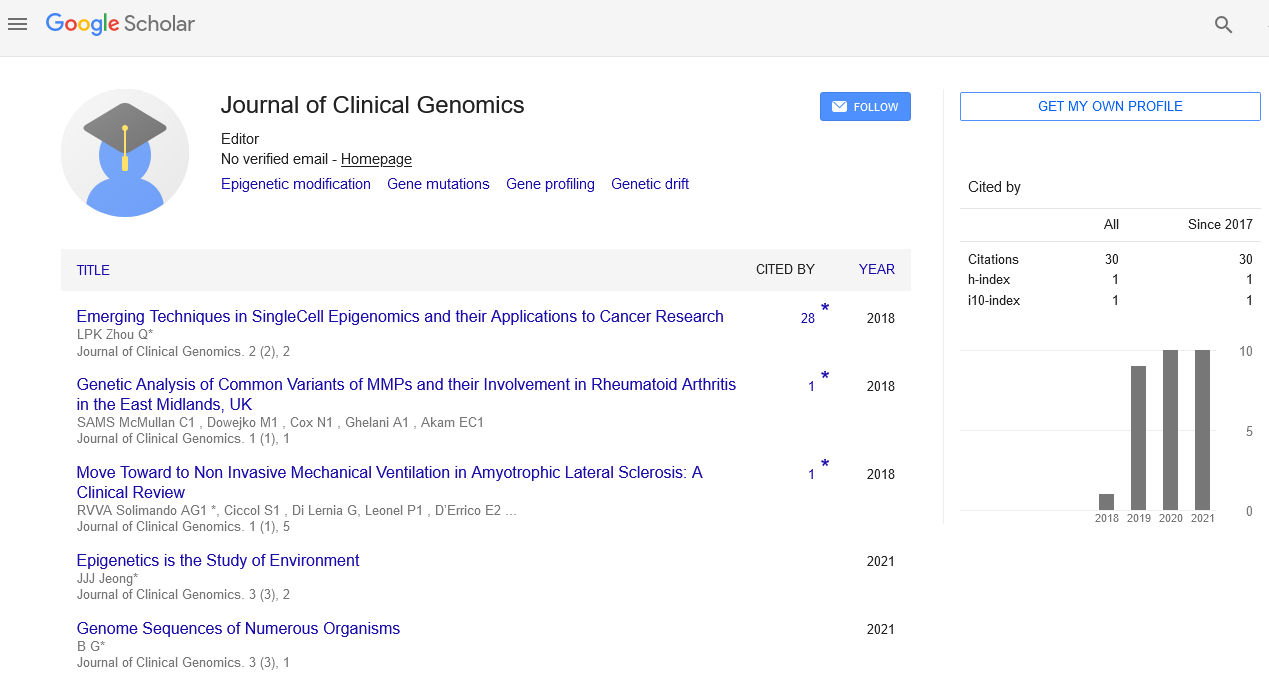Opinion Article, J Clin Genom Vol: 5 Issue: 2
Advances in Oncogenomics from Biomarkers to Novel Therapeutic Strategies
Kirsten Ellegaard*
1Department of Genetics, Copenhagen University, Copenhagen, Denmark
*Corresponding Author: Kirsten Ellegaard,
Department of Genetics, Copenhagen
University, Copenhagen, Denmark
E-mail: Kristen@elle.de
Received date: 23 May, 2023, Manuscript No. JCG-23-107399;
Editor assigned date: 26 May, 2023, PreQC No. JCG-23-107399 (PQ);
Reviewed date: 12 June, 2023, QC No. JCG-23-107399;
Revised date: 19 June, 2023, Manuscript No. JCG-23-107399 (R);
Published date: 26 June, 2023 DOI: 10.4172/JCG.1000132
Citation: Ellegaard K (2023) Advances in Oncogenomics from Biomarkers to Novel Therapeutic Strategies. J Clin Genom 5:2.
Description
Oncogenomics is the study of the genetic alterations driving cancer development, has witnessed remarkable advancements over the past few decades. These breakthroughs have not only deepened our understanding of cancer biology but have also paved the way for novel therapeutic strategies that target specific genomic alterations. The significant advances in oncogenomics with a focus on the discovery and utilization of biomarkers and the development of innovative therapeutic approaches hold the potential to revolutionize cancer treatment.
Oncogenomics has enabled the identification of driver mutations, which are genetic alterations responsible for initiating and promoting cancer growth. Through large-scale genomic studies, such as The Cancer Genome Atlas (TCGA) project, numerous driver mutations have been identified across various cancer types. These discoveries have shed light on the molecular pathways that underlie cancer development and progression. The identification of predictive biomarkers allows oncologists to tailor treatment plans based on the genomic profile of a patient's tumor. For instance, the presence of specific mutations can predict a patient's response to targeted therapies, immunotherapies, or chemotherapy, thereby optimizing treatment outcomes and reducing unnecessary side effects.
Oncogenomics has also unraveled prognostic biomarkers that help stratify patients into different risk groups. This knowledge assists clinicians in predicting the likelihood of disease recurrence and overall survival, aiding treatment decision-making and patient management. Biomarkers in oncogenomics can be used to monitor a patient's response to treatment and the development of drug resistance. Realtime monitoring of tumor genomic changes enables clinicians to adapt treatment regimens to overcome resistance and improve patient outcomes.
One of the most significant advancements in oncogenomics is the development of targeted therapies. These drugs are designed to specifically inhibit the activity of mutated or overexpressed proteins driving cancer growth. Examples include Tyrosine Kinase Inhibitors (TKIs) that target aberrant kinase activity and monoclonal antibodies that bind to specific receptors on cancer cells. Targeted therapies have demonstrated remarkable success in treating various cancer types, leading to improved survival rates and fewer adverse effects compared to traditional chemotherapy. Immune checkpoint inhibitors represent a groundbreaking class of immunotherapies that have transformed cancer treatment. By blocking proteins that inhibit the immune response, such as PD-1 and CTLA-4, these therapies unleash the patient's immune system to recognize and attack cancer cells more effectively.
Oncogenomics has played an important role in identifying predictive biomarkers, like PD-L1 expression, to identify patients most likely to respond to immunotherapies. This study has facilitated the development of Chimeric Antigen Receptor (CAR) T cell therapy, a cutting-edge immunotherapy that involves genetically engineering a patient's T cells to target specific cancer antigens. The personalized approach has shown remarkable success in treating certain hematological malignancies, offering new hope to patients with otherwise refractory disease. With the aid of oncogenomics, researchers are developing cancer vaccines that target tumor-specific antigens, training the immune system to recognize and attack cancer cells. These vaccines hold promise as preventive measures or adjuvant therapies to prevent cancer recurrence.
Challenges and Future Directions including advances in oncogenomics have been promising, several challenges remain on the path towards implementing these novel therapeutic strategies into routine clinical practice. Tumors often exhibit genetic heterogeneity, with different regions of the same tumor having distinct genetic alterations. This poses challenges in accurately identifying actionable mutations and effectively targeting all cancer cells within a patient's tumor. Despite initial responses to targeted therapies, resistance to these treatments can develop over time. Understanding the underlying genomic changes that drive resistance is crucial to develop strategies to overcome this challenge. Incorporating biomarker-driven patient selection in clinical trials is essential to accurately evaluate the efficacy of targeted therapies. Innovative trial designs that consider patient stratification based on genomic profiles are needed to accelerate the development of oncogenomics-based treatments.
 Spanish
Spanish  Chinese
Chinese  Russian
Russian  German
German  French
French  Japanese
Japanese  Portuguese
Portuguese  Hindi
Hindi 